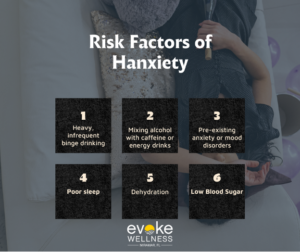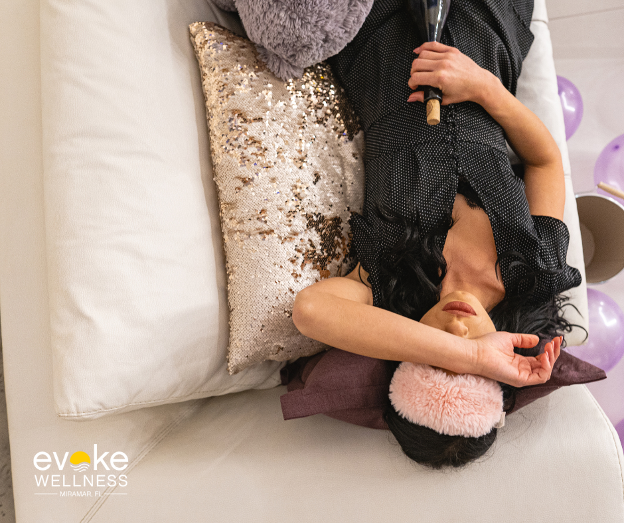As you wake up the morning after a night of heavy drinking, feelings of dread and anxiety wash over you. You may be experiencing “hangxiety” – intense anxiety that follows a night of alcohol consumption. This increasingly common phenomenon can be deeply unpleasant. In this article, we’ll explore what hangxiety is, what causes it, and how you can manage it. We’ll also discuss treatment options like:
- Mental health treatment programs
- Substance abuse treatment programs
- Addiction treatment programs
- Dual diagnosis treatment programs
- Sober support groups
- Alumni programs
- Aftercare programs
While hangxiety can feel debilitating, you don’t have to suffer through it alone. Help and support are available. Keep reading to learn more.
Together, let’s embrace the journey to recovery and the promise of a new beginning. Call us at (833) 819-6066 today or reach out online.
What Is Hangxiety?
“Hangxiety” is a portmanteau combining the words “hangover” and “anxiety.” It describes the feeling of heightened anxiety, irritability, and worry experienced after heavy alcohol consumption.
Hangover’s Mental Effects
While a hangover’s physical symptoms like headache and nausea are well-known, its mental impacts are often overlooked. Alcohol is a central nervous system depressant that disrupts brain chemistry and neurotransmitter levels.
When alcohol leaves the body, the brain experiences a rebound effect. This can trigger anxiety, mood swings, restlessness, and even panic attacks – collectively known as “hangxiety.”
Risk Factors

Treatment & Prevention
The only cure is time for alcohol to fully metabolize. Hangxiety symptoms typically subside within 24 hours. However, self-care measures can provide relief:
- Stay hydrated, get rest
- Eat foods rich in vitamins and minerals
- Avoid more alcohol or caffeine
- Practice relaxation techniques like deep breathing
Seeking professional support is advisable for frequent hangxiety episodes or co-occurring mental health issues. Evoke Wellness offers comprehensive mental health, substance abuse, and dual diagnosis treatment programs to support full healing.
What Causes Hangxiety?
Alcohol’s Impact on Brain Chemistry
Alcohol is a depressant that slows brain activity and neurotransmitter production. As it wears off, brain chemistry gets disrupted – leading to feelings of anxiety, restlessness and irritability. This “hangover anxiety” or “hangxiety” results from:
- Depleted serotonin and dopamine levels
- Disrupted GABA and glutamate balance
- Dehydration and electrolyte imbalances
Rebound Effect
Alcohol initially provides relaxation by increasing GABA, which soothes the brain. However, the brain compensates by producing more glutamate – leading to a “rebound” of anxiety once alcohol is eliminated.
Psychological Factors
Besides physiological effects, psychological factors like shame, guilt or embarrassment about one’s behavior while intoxicated can amplify hangxiety. Anticipating difficult social situations can worsen anxiety.
Individual Factors
Individual differences in alcohol metabolism, pre-existing anxiety disorders, genetics, poor sleep and other mental health conditions can make some people more prone to hangxiety than others.
How to Prevent Hangxiety
Practice Moderation
- Limit alcohol intake to manage hangover symptoms and anxiety the next day.
- Pace yourself by alternating alcoholic drinks with water.
- Stop drinking a few hours before bedtime to allow time for your body to process the alcohol.
Stay Hydrated
- Drink plenty of water before, during, and after consuming alcohol.
- Dehydration can worsen hangover effects and increase anxiety levels.
- Electrolyte-rich beverages like sports drinks can also help combat dehydration.
Prioritize Sleep
- Aim for 7-9 hours of quality sleep after drinking. Alcohol can disrupt sleep cycles.
- Create a relaxing bedtime routine to wind down properly.
- Consider taking a magnesium or melatonin supplement to improve sleep quality.
Eat Nutrient-Dense Foods
- Alcohol depletes vital nutrients, so replenish with foods rich in vitamins and minerals.
- Opt for complex carbs, lean protein, fruits and veggies the day after drinking.
- Foods with ginger, honey or fructose can provide relief for nausea or headaches.
Manage Stress Levels
- Find healthy outlets to reduce stress, a major hangxiety trigger.
- Exercise, yoga, meditation or talking to a friend can be beneficial.
- Prioritize self-care activities that promote relaxation and mindfulness.
How to Get Rid of Hangxiety
Hangovers can leave you feeling anxious and on edge the next day – a phenomenon known as “hangxiety.” To combat this unpleasant experience, try these tips:
Stay Hydrated
Alcohol is a diuretic, causing dehydration that can worsen hangover symptoms like anxiety. Drink plenty of water before, during, and after consuming alcohol to stay hydrated.
- Alternate alcoholic drinks with glasses of water.
- Sip an electrolyte-rich sports drink to replenish lost minerals.
Eat a Nutritious Meal
Alcohol depletes vitamins and nutrients, which can contribute to hangxiety. Eat a meal with complex carbs, protein, and healthy fats before drinking to stabilize blood sugar.
Get Enough Sleep
Lack of quality sleep can amplify hangxiety. Aim for 7-9 hours of uninterrupted rest to allow your body to recover.
- Create a calming bedtime routine to promote better sleep.
- Use blackout curtains or an eye mask to block light.
Practice Relaxation Techniques
Deep breathing, meditation, or gentle yoga can counteract anxious feelings by inducing a relaxation response.
- Try a guided meditation app or video.
- Take a warm bath with Epsom salts to relax muscles.
Seek Support If Needed
If hangxiety persists or you struggle with alcohol use, don’t hesitate to reach out for help from a counselor or support group. Professional treatment programs are available.
Hangxiety FAQs
What is hangxiety?
- Hangxiety refers to feelings of anxiety, worry or stress experienced after drinking alcohol. It is considered a form of alcohol-induced anxiety.
- Common symptoms include racing thoughts, restlessness, irritability and feelings of dread or panic.
Why does it happen?
- Alcohol is a depressant that disrupts neurotransmitter levels in the brain. As it metabolizes, this can trigger rebound anxiety.
- Dehydration, poor sleep, and vitamin deficiencies from heavy drinking may also contribute to hangover-related anxiety.
Who is at risk?
- Those with a family history or personal experience of anxiety disorders are more prone to hangxiety.
- Individuals who are already managing conditions like depression or substance abuse issues may experience worse hangxiety symptoms.
How can I reduce it?
- Limit alcohol intake, stay hydrated, get adequate rest and nutrition after drinking episodes.
- Practice stress management techniques like deep breathing, meditation or light exercise.
- Seek support if hangxiety persists or worsens through counseling, therapy or support groups.
By understanding hangxiety’s causes and risks, individuals can take proactive steps to minimize its effects and prioritize their mental wellbeing after social drinking occasions.
Conclusion
In conclusion, while hangxiety can feel overwhelming in the moment, there are many resources and treatment options available to help you manage symptoms and understand the underlying causes. Consider connecting with a mental health professional and exploring treatment programs tailored to substance use and co-occurring disorders. Participating in sober support groups and aftercare can also provide community and teach valuable coping skills. With compassion for yourself and commitment to your wellbeing, you can move past hangxiety and maintain the benefits that come with healthy social connection.
Begin Your Journey with Evoke Wellness at Miramar
If you or a loved one is considering treatment, Evoke Wellness at Miramar invites you to contact us. Our compassionate team is ready to answer your questions, discuss your needs, and help you take the first steps toward recovery. In Miramar, you’ll find more than just a treatment program – you’ll discover a community dedicated to your wellness and success. Together, let’s embrace the journey to recovery and the promise of a new beginning. Call us at (833) 819-6066 today or reach out online.


